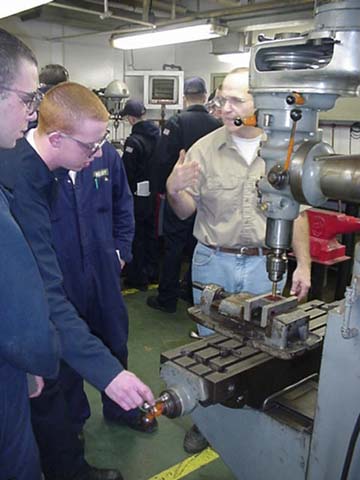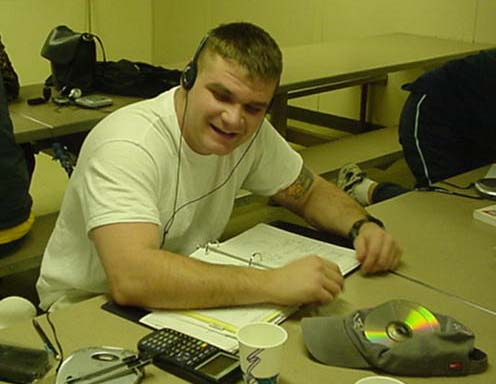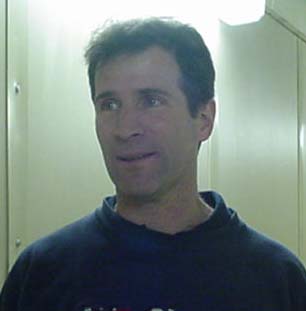
| January 2002 | ||||||
| Sun | Mon | Tue | Wed | Thu | Fri | Sat |
| 1 | 2 | 3 | 4 | 5 | ||
| 6 | 7 | 8 | 9 | 10 | 11 | 12 |
| 13 | 14 | 15 | 16 | 17 | 18 | 19 |
| 20 | 21 | 22 | 23 | 24 | 25 | 26 |
| 27 | 28 | 29 | 30 | 31 | ||
Wednesday 23 January 2002
At 1200, EST the Training Ship Empire State was located 143 nautical miles east of Progresso, Mexico, at 23 degrees and 23 minutes North Latitude and 090 degrees 49 minutes West Longitude, steering course 240 degrees true at a speed of 11 knots. The weather continues to be unbelievable; clear, wind from the east southeast at 15 to 20 knots, air temperature was 79 degrees Fahrenheit, barometric pressure was 1019 millibars, seas were from the southeast at 4 to 7 feet, sea injection temperature was 78 degrees Fahrenheit. Depth of water beneath the keel was 2057 fathoms.
CAPTAIN'S LOG
"Even if you're on the right track you'll get run over if you just sit there."Will Rogers
In all my years of sailing, I can't remember the Western Gulf being this beautiful. It is usually a triple "H" part of the world in winter: hazy, hot, and humid. The past few days have been clear, calm, and cool. Aboard ship though, we have added our own sweat factor. Today is oral deck quals for the 4/c cadets. They stand in long lines at the bridge, memorizing data until the last moment when they step before the Training Officer and await the barrage of incoming questions. "High pressure" is an appropriate weather term for the ordeal. Meanwhile, all of Division 1 will have their final exams tomorrow. This will substantially complete the graded portion of their sea term, but much work still remains as they switch to the "maintenance" rotation.


Now that we have settled into steady state steaming, I want to formally introduce our newest additions to the annual Sea Term. Most everyone knows that we allocate our time to perfecting the professional skills necessary to operate the world's largest ships at sea and to move cargo to any port in the world. That is the purview of the Marine Transportation and Marine Engineering cadets and one must work to avoid writing about them when discussing anything Maritime. But, we have two other very professional majors represented on this Sea Term also. The Marine Safety cadets have been here for more than ten years now and are well established. The "crunchies" as they are affectionately called have the unenviable task of protecting us from ourselves. Not only do they monitor environmental compliance in a global sense but they are keenly aware of more common workplace hazards as well. Industrial Hygine is the technical term for it. They keep us honest in the hearing and sight conservation programs, ensure compliance with pollution/air quality standards and also try to protect us from the menaces of heat.
Now, we have our first class of declared International Maritime Business (IMB) Cadets aboard. (no nickname,yet.. any ideas?) When this new course of study was first discussed, we went to industry leaders and sought input concerning business needs and trends. The opinions were diverse but unanimous on two points. Each leader highly recommended that the students participate in the Regiment and in Sea Terms. Most stated that business students were easy to find but disciplined, business people with a working knowledge of the maritime terminology, practical experience with the hardware, and appreciation for the demands imposed by the sea were nearly non-existent. Sea Term fixes that.
In Norfolk, the IMB class toured one of the world's most modern international ocean freight terminals and returned to Empire State with valuable insight about the behind the scene complexity and with a better grasp of the professional skills that are necessary to make it go. We will follow up with similar trips in Mexico, Puerto Rico and Fort Lauderdale.
Dr. Jamie McDonald (MMA '81) teaches the classroom portion of the IMB curriculum on Sea Term. He graduated from MMA with a degree in Marine Engineering, has a Masters from The University of Chicago and a Doctorate from U Mass. His foundation of maritime experience brings relevance to the classroom and uniquely qualifies him to draw business topics and shipboard experiences together.

Thus far, everything is going well. Dr. McDonald's new students are studying the "business of shipping" when for years MMA has been a leader in the shipping business. So, here they are, the hot new major, the "IMBers", toiling beside the more traditional "deckies," "snipes", and "crunchies"- contributing equally to our success. We are glad to have them. See you tomorrow.
CADET'S COMMENT
Two Days 'till Mexico by 1/c Katelyn Ladden
I could not ask for a nicer day! The sun is shining brightly, there are few clouds in the sky, and the ship is gently rolling from side to side. The past few days have been just as beautiful, much to the delight of the sunbathers. It is amazing how quickly one gets used to the tropics. It is now basically just another ordinary day out at sea!
As we approach port, however, the routine changes a little. Tomorrow is the dreaded "Captain's Inspections". These inspections are rigorous, just like the Admiral's Inspections that the cadets have in the dorms. The only difference is that if your berthing area does not meet the Captain Bushy's approval; it won't be just demerits you look at... liberty in Mexico may be curtailed. To earn liberty, the berthing areas must be absolutely spic and span. The Captain and other officers will inspect the senior cadet main deck rooms at 1300 and then the freshman, sophomore, junior, and senior berthing holds at 1900. Getting 400 young people to pull together to clean their rooms and lockers is never easy. Having to do it under cramped conditions with everyone working shifts all night and all day makes the task incredibly hard. Some key things that the Captain looks for are: any dust on top of the lockers; tight, neat racks are a must; immaculate heads and showers; a swept and mopped and polished deck; and the uniform/personal appearance of each cadet must shine. The standards are high, but the motivation is greater.
After inspections are over (and we all pass- keep your fingers crossed for us) the Captain will meet with each class and give the cadets his famous pre-port briefing. We will be instructed as to the "dos and don'ts" in this port. One thing he stresses every year: upperclassmen MUST watch out for the underclassmen.
After the meeting with the Captain, the cadets will hang around the stern or in the messdeck making plans with their shipmates for when liberty is granted in Mexico. Laughter will punctuate the conversations, especially the upperclassmen who will retell stories of past cruises and of the places they traveled. The anticipation of arriving in port and seeing a new place for the first time will be enough to keep many cadets awake at night, lying in bed and dreaming of the upcoming adventures.
QUESTIONS FOR THURSDAY 24 JANUARY
MATH: The most common elements and their portions of the earth's crust are, Oxygen at 0.4660; Iron at 0.0500; Silicon at 0.2772; Aluminum at 0.0813; Sodium at 0.0283; Calcium at 0.0363; Potassium at 0.0259 and Magnesium at 0.0209. Name the most abundant element. Name the least abundant.
SCIENCE: Carbon dioxide and other gases in the earth's atmosphere absorb infrared energy from the sun. Carbon Dioxide gas traps heat, what is this process called?
GEOGRAPHY: A long string of low islands extends south and west from the lower part of Florida. What is the name of this group of islands? Name several of the larger islands.
HISTORY: When someone learns geography, they come to understand how the features, climate, and other characteristics of a place make a difference in the lives of the people who live there. The geography of a place is almost certain to influence its history. Looking at a map of Florida we see many islands that extend south of Florida and gently curve to the west. Starting with the early voyages of the Spanish and continuing to the present time, many ships have sailed in these waters (just as our ship has). Some ships traveled safely through; others have not been so fortunate. When ships have wrecked here, people have taken advantage of these accidents and developed a way of making a living based on the dangerous waters nearby. What name has been given to those who, in the past, made their living from the maritime accidents near them?
ANSWERS FOR WEDNESDAY 23 JANUARY
MATH: To find the mean of the scores, add the points 13, 15, 20, 22, 18, and 10. Then divide the total by 6. The average is 16.33.
SCIENCE: The prefix "iso" means equal. The root word "therm" means heat; "bar" means weight; same temperature and same pressure.
GEOGRAPHY: Florida leads the nation in the production of citrus fruit The five fruits are: oranges, grapefruits, tangerines, tangelos, and limes.
HISTORY: Hernando De Soto was the leader.